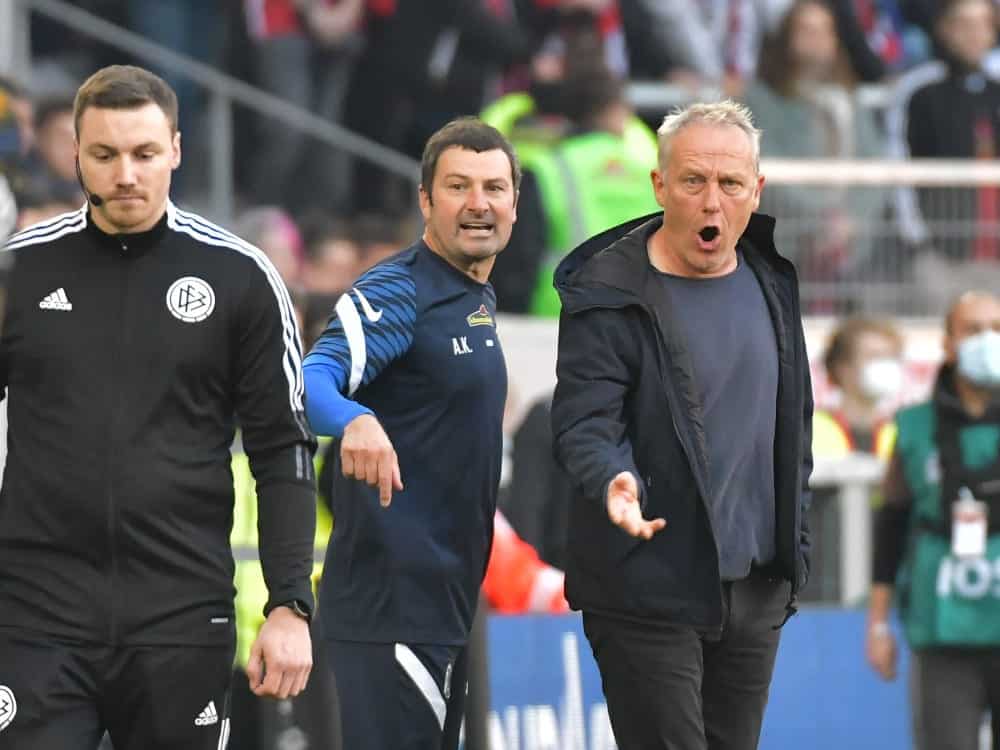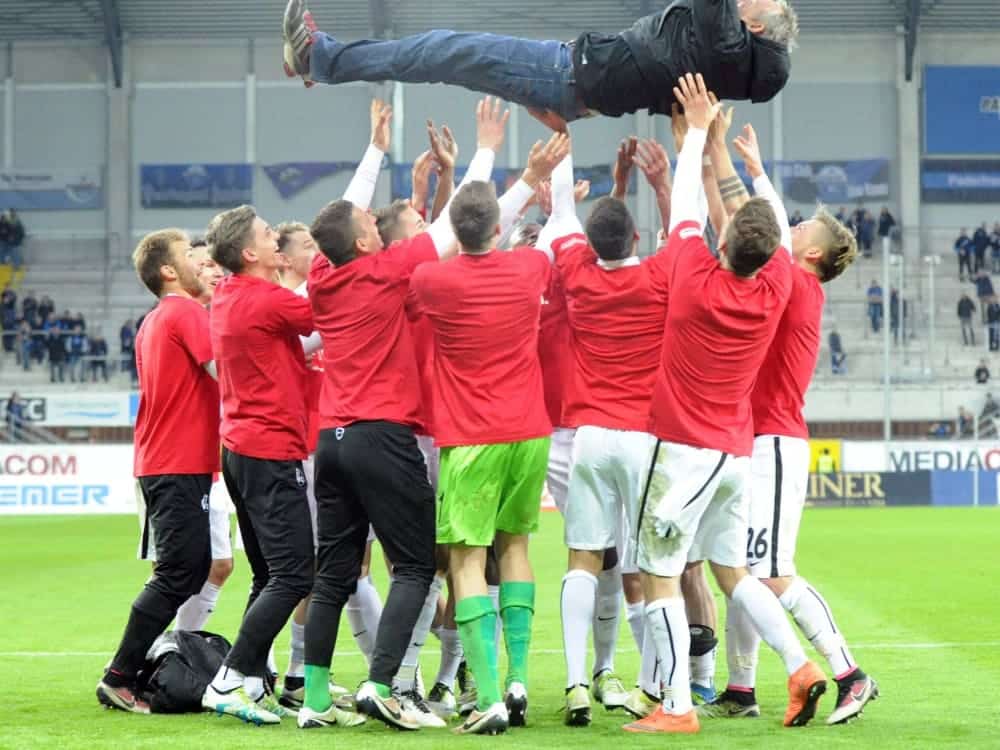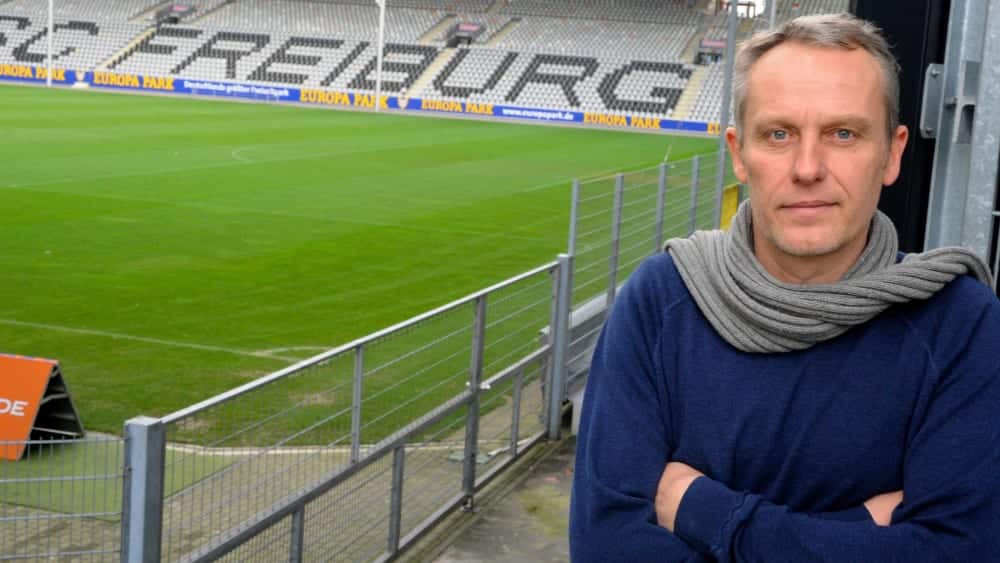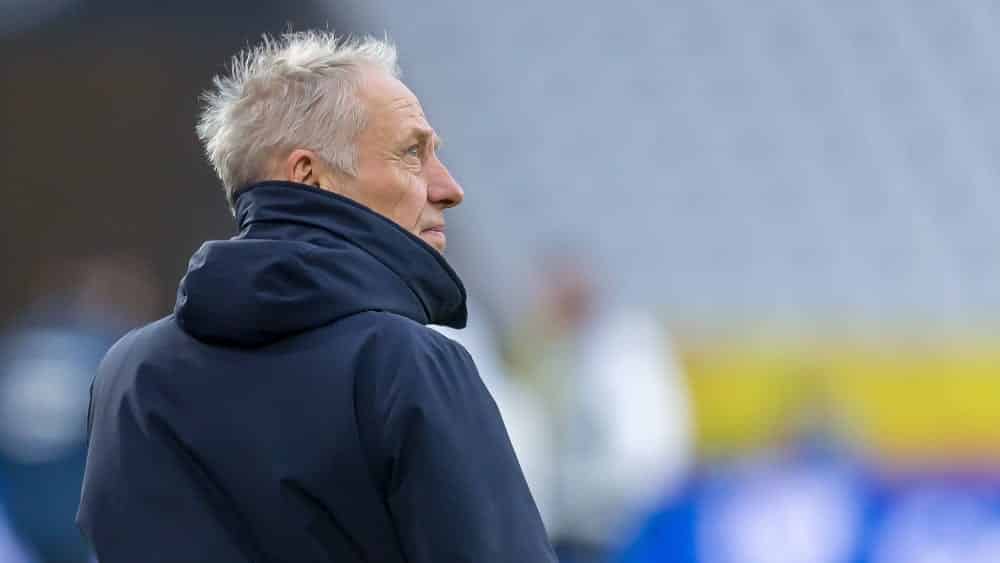On Wednesday, Christian Streich celebrated his tenth anniversary as coach of SC Freiburg. In the second part of the anniversary interview, the 56-year-old talks about the most important goal, bitter losses and his future on the bench of the Breisgauer.
2012 you said that it is particularly important to you that you do not want to change significantly as a person. Have you managed to do that to your satisfaction so far?
To a certain extent.
Your coaching team has played a big part in your successful record. Co-coaches Patrick Baier and Lars Voßler as well as goalkeeping coach Andreas Kronenberg have been with you since the beginning, Florian Bruns joined in 2017, and 2018 saw the only change, with Daniel Wolf replacing Simon Ickert as athletics coach. Your ex-captain Julian Schuster has been a liaison coach to the football school on and off for three years. Why does it work, why don’t the attrition processes take effect here?
Everyone has their areas, but they overlap with each other. Our work is holistic, I think the boys enjoy that. What I then have to decide, I almost always discuss with them beforehand, for example the line-up, even controversially, everyone gives their opinion. It overlaps, which is fruitful and motivates us.
You call your colleagues fellow coaches and often praise them. In the 2nd round of the cup in Osnabrück, it was surprising that you, as a team player, didn’t stand arm in arm with the rest of the bench during the penalty shootout, but sat alone on a chair a few metres away.
That was simply because I thought the best thing to do now was to sit and watch the penalty shoot-out – to calm down. After the gruelling 120 minutes in the great, heated football atmosphere there and addressing the team, this calm will do me and the players good, that was my thought. I and my fellow coaches don’t need a symbol of cohesion at a time like this.
What is the biggest achievement of your coaching team in the ten years?
That we played nine-tenths of the time in the Bundesliga and became champions the year after relegation. We’ve had success within the means of SC Freiburg and play football in such a way that people enjoy coming to our stadium. And we have a very good relationship with the boys over the years. There have been countless close ties and friendships between the physios, players, us coaches and other close staff. We are and always have been a community. This term is easy to pronounce, but living community in a positive sense is not so easy.
You’ve also been familiar with sporting director Klemens Hartenbach and sporting director Jochen Saier for over 20 years. You once said that Hartenbach couldn’t be poached because he was rooted in Freiburg. And Saier?

I think the same applies there. Jochen has everything here, is at home and can make a super impact. We’ll soon have 30,000 members, he’s fully occupied, it’s not easy because we’re growing. He has to hold countless talks every day, which is mostly nice, but also hard work. Jochen has been with the association for ages, and for all of us it’s true: we get to work in a super association with good people. Not so many people have that.
How difficult will it be to say goodbye to Kronenberg in the summer of 2022, who has shaped many strong keepers and will then only be the national goalkeeper coach?
Very heavy. For me, he is an extremely important person who has an enormous feel for the team, who has supported me and all of us super over the years. This is a bitter loss for me, humanly and professionally. He knows what community is, he can take a step back, and yet he is there. Those are qualities you don’t find very often.
He is the first central building block of your time to leave. Does that cause concern?
We don’t stop anything, it comes as it comes.
Can you understand him?
I can understand everything the ‘crown’ is doing, but I still feel sad. I’m losing ‘Krone’s’ intuition, I basically have long relationships in my life, saw him almost every day for several hours for over ten years. This is not easy for me.
Who will be the successor?
Someone will come who is a good fit for us.
The club has long since ceased to be small and poor, it has also built up a financial substance that allows it to compete for a place in the first half of the table. The new stadium further expands the possibilities. Why does non-relegation remain the annual goal?

Staying above the line, that’s what it’s all about first for many clubs, including time and again for some who didn’t even believe it was about that. Then they realised it too late and were relegated. If we get the Bundesliga, it’s not a bad year, even if we might not be satisfied with everything. That goes for about ten clubs, maybe they see it differently. But once they’ve been relegated, they’ll see it the same way.
Which clubs do you mean?
There are enough examples: Wolfsburg was in the relegation twice, Hamburg has been down longer now, Stuttgart was relegated twice last time. So another year in the Bundesliga is good for us for now.
That was also possible because of the great continuity in the squad. At the beginning, you always had to give away some of the best players. SC continues to live off transfers, but can now also keep top players, as was the case this time when only Baptiste Santamaria was released because an adequate replacement was available in the form of Maximilian Eggestein. Are you most pleased about that?
It helps when boys stay at the club longer and you can take the development steps with them. That strengthens the team. Alexander Schwolow, Robin Koch and Luca Waldschmidt didn’t leave until 2020, but we no longer have to sell the best every summer. This is what we have worked for.
Most recently, you formulated a justified self-praise that almost every player at Sport-Club improves over the years. What excites you about player development?
Being able to work with young people who are talented in their field and being able to assist them is great, that’s the process, that’s the positive thing about life. That’s what we can do here, but you can’t take yourself too seriously in the process. It’s nice to be able to help a player develop as an individual, to be able to fit into a community. Because we’re playing at the weekend, and if you want to win, you have to defend together and attack together.
How does player development work? Let’s take Lucas Höler. He came from second-division club Sandhausen in January 2018 as a strong-running striker with a good attitude, but who was technically unfamiliar with the Bundesliga level. Was it on the plan that we have to train his passing, his taking and receiving, his ball retention and forwarding as well as his finishing?
Lucas is very open and approachable, I quickly got the feeling that this is a great guy who puts everything into improving and being on the pitch. I found that exciting, and then we trained. In training I saw that he works on the things we discussed, can implement things we showed in the video analysis and looks for solutions, for example, that he doesn’t lose the header duel with the centre-backs.
How have you improved his technique together?
It’s mainly about repetitions. After practice, in addition, he went to the wall for passing drills, got a partner or coach and practiced things we talked about. 15, 20 minutes, and we were always exchanging. I saw that he got better and better, even when he wasn’t so good in training, because he learned from that. The playing time did the rest. The most important thing is openness and understanding the game. How do opponents act? What possibilities do I have against them? Where are the spaces? We talk about that, show it in individual and team videos. Then the boys get better, some a lot compared to the starting level, others only a little.
What have you become better at over the years?
Phew, you’ll have to ask others. You gain experience, you’ve seen thousands of games. Maybe I’ve become more lenient with players who are disappointed, don’t play and have a hard time. I don’t weigh everything with gold scales any more. I try not to be offended when a player reacts emotionally. I try to reflect that I used to sit on the bench and in the stands and how unhappy and hurt I was. I try to convey to them that it shouldn’t be a slight and to talk to them about it at the right moment. Sometimes it’s better not to talk. Overall, it’s about doing the players some justice, because you can’t do them justice anyway. That way you can have a good relationship despite difficult situations, even afterwards.
Was there any feedback?
Yes, indirectly, when journalists or other people tell me that they have talked to players who didn’t play that much with me and still didn’t say anything bad. That made me very happy that they didn’t say: that idiot. That’s difficult, but if it works most of the time, we haven’t done everything wrong in our dealings.

Professional footballers often give up many formative experiences such as freedom in adolescence, training, studies, everyday working life, family celebrations, weddings, travel, hobbies, especially in the phase between about 12 and 35, which is important for personality development. In your opinion, is it possible to make up for this after the mid-30s?
When I see many players with us, what developments they have made in their personalities, which also has to do with the continuity, calmness and attachment to this one place with us, I think some players have missed nothing. Some have gone on to further education, studies on the side. When you hear that Giorgio Chiellini is now doing a Master’s degree and playing in the Champions League, you see what opportunities there are. It’s very individual, but of course there’s a danger that you don’t do enough as a professional on the side.
Would you generally still recommend a backpacking holiday to your professionals, i.e. regardless of the current pandemic restrictions, like you did during your playing days, to get to know the country and the people intensively? Or would you as a coach prefer to relax in an all-inclusive luxury hotel in the Persian Gulf?
You don’t have to go to a luxury temple in the Persian Gulf, you can also put your feet up somewhere else. The way I did the backpacking trip, it wasn’t the optimal recovery period, but that’s not what I wanted. There weren’t that many people who did it that way back then either. But I needed it because I had an incredible hunger and curiosity to be able to travel to India or somewhere else. The time was actually much too short, but I needed that.
You come from a family of butchers. Was it ever in your mind that you could be a millionaire one day?
Millionaire? In my head?
Yes.
I didn’t think about money. I just lived, didn’t have a car for years, then at some point a small Peugeot, I didn’t attach importance to things like that, so I always had enough money to go out to eat or take trips.
You gained your material wealth by pursuing your great passion. In return, you are on the road a lot, you hardly have any free weekends, and you don’t have much time off to relax. How high is this price?
I just love football, and you have to pay a price for everything. Every profession has a price, and it’s often not small. Maybe it just has to be that way. I could do three different things that interest me, but then I wouldn’t have much time. I could do less, then I would have less materially, but more free time. But I wanted to play football and I really wanted to play at a high level. Now I’ve been lucky enough to be able to do that for 25 years, so it’s great that I’ve been able to experience it like this so far.
And your price is lower because you work in your home country with family and friends and you can spend time with them right after work?
Yes, it is lower. However, some fellow coaches say they are very happy if no one is waiting at home when they are in another city because then they can stay in the office and have no pressure. My family doesn’t put any pressure on me. There are pros and cons for everything. I have an exceptional situation in the Bundesliga as a coach, which I think many would wish for, but that would be unrealistic. It just happened the way it did. It has to do with SC Freiburg and other things, it just so happens that I was socialised here.
Do people in Freiburg continue to leave you alone for the most part? Can you still do bulk shopping without much hindrance or does your partner do it?
I still go shopping, but not as much as my partner, and of course I am left alone. People nod at me or say hello or a few sentences, sometimes I take a photo. With the locals this happens less, it’s more when tourists are there and then they see me.
Did you have to give up habits? Do you still cook often?
I don’t cook much anymore and I miss it, but my partner cooks so insanely well and when I come home she has often cooked for all of us. Then I’m glad I don’t have to cook anymore. So it becomes a habit, and I usually don’t come home so early. But during international breaks, I like to cook or we cook together.
What luxury do you allow yourself?
Eating out. We have the opportunity to go on holiday, buy books and records. Not having money worries is also a luxury. And we have an insanely beautiful garden, which we got by chance and luck in Freiburg. We live in a nice neighbourhood, I can ride a bike.
16 years on the Freiburg bench? “No “
You once said that Volker Finke’s 16 years in office were unimaginable for you. On your five-year anniversary, you couldn’t imagine another five years at a stretch either. Are the 16 years now conceivable after all?
No.
What do you say to the ten years?
Brutal. Insane.
Did they go by quickly?
In retrospect yes, but not during. There were so many things happening. I put so many things in my head that aren’t there, but if one would press on the head or I see an ex-player from a certain time, it all comes back. You experience so much, you really have to put it somewhere. I don’t even know where it all is, I have a big head but it’s not that big.
You decide every year with the people in charge to extend your contract. You don’t have an advisor. Does anyone else support you here, like a lawyer?
I used to, but in the last three years it hasn’t been an issue anymore.
When you turn 60: Is that a mark to quit?
No, it’s not a brand.
Your energy level decides?
That, and health. And of course it’s about what the club says. It can be, they say next year: maybe it’s enough. Then maybe I ask why and can convince them again or the other way round. We talk to each other, and I hope that at some point we can part and say that it was a great time, even if it hurts one side more at first. That is the goal.
Your daughter is grown up, your son knows you almost only as a Bundesliga coach. Are you worried about what comes after Day X, or do you already know roughly what you want to do after your career?
I don’t know. I don’t have any worries, but it does bother me sometimes. Then I think, how will it be, how does it feel, what do I do?
Can you imagine a job without football?
I can imagine it, but I don’t know if it’s feasible.





